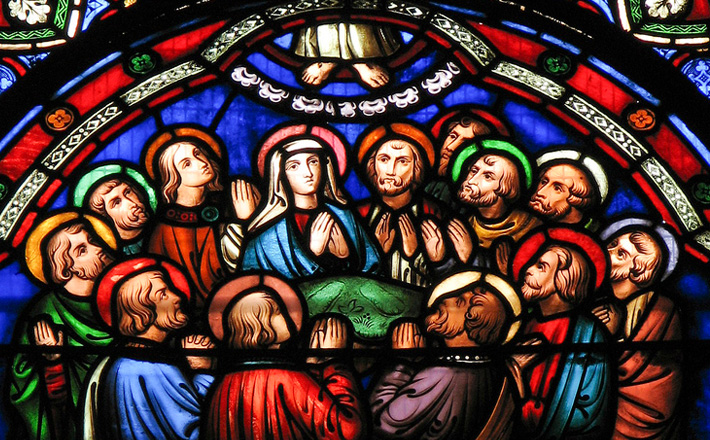Commentary on Psalm 68:1-10, 32-35
When God shows up, everything changes.
Psalm 68 celebrates the appearance of God as divine king and catalogues the implications of God’s rule throughout the entire world.
This highly complex Psalm contains some of the Old Testament’s most challenging grammar, vocabulary, and syntax. It also presents uniquely explicit depictions of God’s violence against the enemies (verses 21-31). For better or worse, these verses do not appear in the lectionary reading for this Sunday, or any Sunday.
To put it mildly, Psalm 68 is a difficult text. Preaching from it requires a great deal of sensitivity to its original historic context and especially an understanding of the royal ideologies of the ancient Near East. Despite these interpretive challenges, we can discern a basic theological message that underpins the psalm: God’s presence brings about vindication for those who are suffering. God comes to deliver the oppressed.
The opening verses invite God to reveal God’s self: “Let God rise up!” (verse 1). In the logic of the psalm, the presence of God banishes all threats. God’s “enemies,” “those that hate him,” and “the wicked” must retreat when God arises.
The Psalter contains a number of similar entreaties for God to rise (for example, Psalm 3:7; 7:6; 9:19). In virtually every case, these texts appear on the lips of those who look to God to bring about justice. To “rise” means to assume the authority to act as king and judge on behalf of those who are crying out for salvation.
God’s judgement, while providing protection to the suffering, has devastating implications for the oppressors. Through a series of richly evocative images, the psalm describes the enemies as disintegrated, dissolved, and destroyed (verses 1-2). The righteous, however, have the opposite response to the risen God. They join together as one in praise (verse 4).
This text provides many challenges for translators. One of the most famous occurs in verse 4, where God is described as either “the one who rides of the clouds” or “the one who rides through the wilderness.” The titles have very different implications for how one understand the profile of God vis-à-vis other ancient Near Eastern deities. Yet the most important issue for the psalmist is establishing the particular name — and thus the reputation of God. The revelation of the divine name Yah, the short form of Yahweh, appears only in this verse. However, the entire psalm is dedicated to exploring the identity of Yahweh as the unchallenged king of heaven.
God’s fundamental orientation is toward the helpless: widows, orphans, the desolate one (or “abandoned one”), and prisoners (verses 5-6). In a patriarchal culture such as ancient Israel, widows and orphans struggle to survive without a husband or father to provide protection, economic viability, and honor. So God fills the gap left by the absent man (verse 5). Likewise, Yahweh provides for those who are abandoned, giving them a home (verse 6).
Yahweh’s manumission of “prisoners” as described in verse 6 might possibly be understood as a work of advocacy for those who have committed crimes. Yet given the fact that there was no large-scale, long-term imprisonment for criminals in ancient Israel, the “prisoners” in this context are more likely prisoners of war, enslaved captives, or falsely accused individuals awaiting trial. People in any of these situations would need God’s immediate intervention to preserve their lives. Without divine intervention, they would have little hope.
It was indeed a hopeless people whom God delivered from Egypt. Verses 7-10 describe the exodus, the community’s movement through the wilderness from slavery to freedom. In the context of that journey, the forces of nature are bent to God’s will. The earthquake and abundant rain (verses 8-9) are a manifestation of God’s power that provide for those who suffer. To be clear, these displays do not happen simply for God to show off but to bring about deliverance.
The description of God’s power over natural forces gives way to a description of the power of God over all human forces (verses 11-31). This large section of the psalm describes God participating in all the activities of ancient Near Eastern kings. God is called king explicitly in verse 24, and like a king, God leads troops into battle and conquers other warrior kings (verse 11-14). God rides a chariot home from battle in triumph (verses 17-18). God brings back prisoners of war (verse 18). God receives tribute (verses 18, 29, 31). God oversees ritual processions (verses 24-27). God shows mastery over wild animals through ceremonial hunts (verse 30).
That God fulfills all these functions of ancient kingship implicitly acknowledges that the kings of Judah and Israel largely failed to live up to the expectations of Near Eastern royal ideology. The witness of the Deuteronomistic history (especially 1-2 Samuel, 1-2 Kings) confirms the failure of the kingship in Israel and Judah as does modern historiography of the biblical world. Thus, the psalmist felt a special urgency for Yahweh to be understood as the divine king, both to provide a model of the proper exercise of power and to serve as king when the kingdom ceased to exist.
When leaders fail to live up to expectations, God’s identity emerges even more strongly as the dominant power in the universe. The psalm’s ultimate affirmation of divine power chastens all other leaders who might assume positions of absolute leadership. In fact, the final verses of the psalm (verses 32-35), where the lectionary reading resumes, contain a call for all the kings of the earth, the potential rivals of God, to acknowledge God’s authority.
This ancient psalm is rife with challenges for the modern interpreter. We must navigate a profoundly difficult text that describes cultural and political institutions that are far removed from our modern democracies, at least in their ideal forms. The psalmist uses analogies from his own historical context to describe the power of God. Those analogies seem strange to our ears. Yet, at the heart of the psalm is a conviction that God’s power is ultimately oriented toward the deliverance of those who are suffering. God’s power is expressed not for some sadistic delight in violent spectacle, but to provide protection for those who are oppressed and have no one to defend them.


May 28, 2017